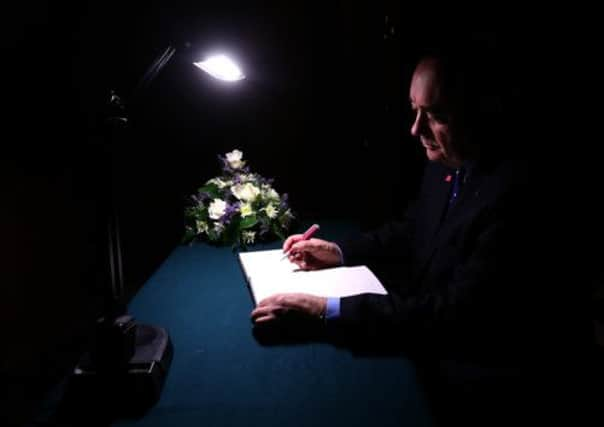Emma Cowing: Tears only human in Glasgow tragedy


First Minister Alex Salmond, whose eyes were red before he even opened his mouth; Police Scotland Chief Constable Stephen House, whose face was etched with the grief and loss of his own colleagues; and Gordon Matheson, leader of Glasgow City Council, still in shock at the horror that had taken place in his home city.
These three men, along with the heads of the fire and rescue service, the ambulance service and Justice Secretary Kenny Macaskill, were there to tell the media that the rescue process was still ongoing, that one fatality had been confirmed, that there were many injured. Now we know that a total of nine people lost their lives that night. A further 12 remain in hospital.
Advertisement
Hide AdAdvertisement
Hide AdIt was, I think, the most moving press conference I have witnessed in my near 17 years as a journalist. It was raw and sad and honest and it has, I think, set the tone for how the people of Glasgow themselves have reacted to this terrible tragedy.
Glasgow – and I speak as a citizen of this city – is grieving. On Sunday I went to the City Chambers, where a book of condolence had been opened. One woman I spoke to, who knew no-one in the pub that night, didn’t even know the bar, was visibly distressed, her eyes full of tears. “It’s just so awful,” she said. “I just feel so terrible for all those people.”
Members of the emergency services – many of whom were there that night and responded incredibly to the task that faced them – have been similarly moved. At Glasgow Cathedral on Sunday morning, I saw ambulance workers, policemen and A&E nurses leave a special service for the victims in tears. When rescue workers and police stopped to form a guard of honour as the last bodies were removed from the Clutha pub on Monday afternoon, the entire city had a lump in its throat.
On Friday, the Scottish Government, in a move that is now tragically timely, will publish a guide entitled Preparing Scotland: Responding to the Psychological and Mental Health Needs of People Affected by Emergencies.
This hugely important document addresses how organisations including local authorities, health and social care services and third sector groups should respond when something like this happens.
It emphasises that most people will be fine, that most of us have a certain resilience, but that we must acknowledge and be aware that for some, the trauma might become too much. That keeping an eye out, checking in with people a month down the line, and being vigilant are all ways to make sure that people are coping.
It states: “Distress following an emergency is very common but, in most cases, transient and not associated with lasting dysfunction or mental disorder. The majority of people are unlikely to require access to specialist mental health care.
“Effective social support plays a vital role in people’s recovery following emergencies. There is evidence that supportive social networks can help people to cope with traumatic events and can protect against the development of stress-related mental illness.”
Advertisement
Hide AdAdvertisement
Hide AdIt emphasises, too, that anyone caught in a tragedy like this might be affected – even if they were simply walking past at the time – and that it is okay for them to feel that way.
When I spoke to one of the authors of the report yesterday, she stressed that the reactions of those involved that we have seen in the press – the weeping relatives, the survivors – are distressing to watch, yet entirely normal.
This is how we are supposed to react when something horrific and out of the ordinary happens to us.
And if, as has been suggested, supportive social networks can help people cope, then Glasgow is going about things the right way. Between the taxi firm offering free lifts to hospital, fund-raising nights organised by musicians, actors and comedians and a hardship fund for those affected, those caught up in this awful tragedy know that Glaswegians have their backing.
The reactions by Salmond, House and Matheson on Saturday morning are not only entirely normal, they are entirely human. And if they can cry, then so, too, can we.